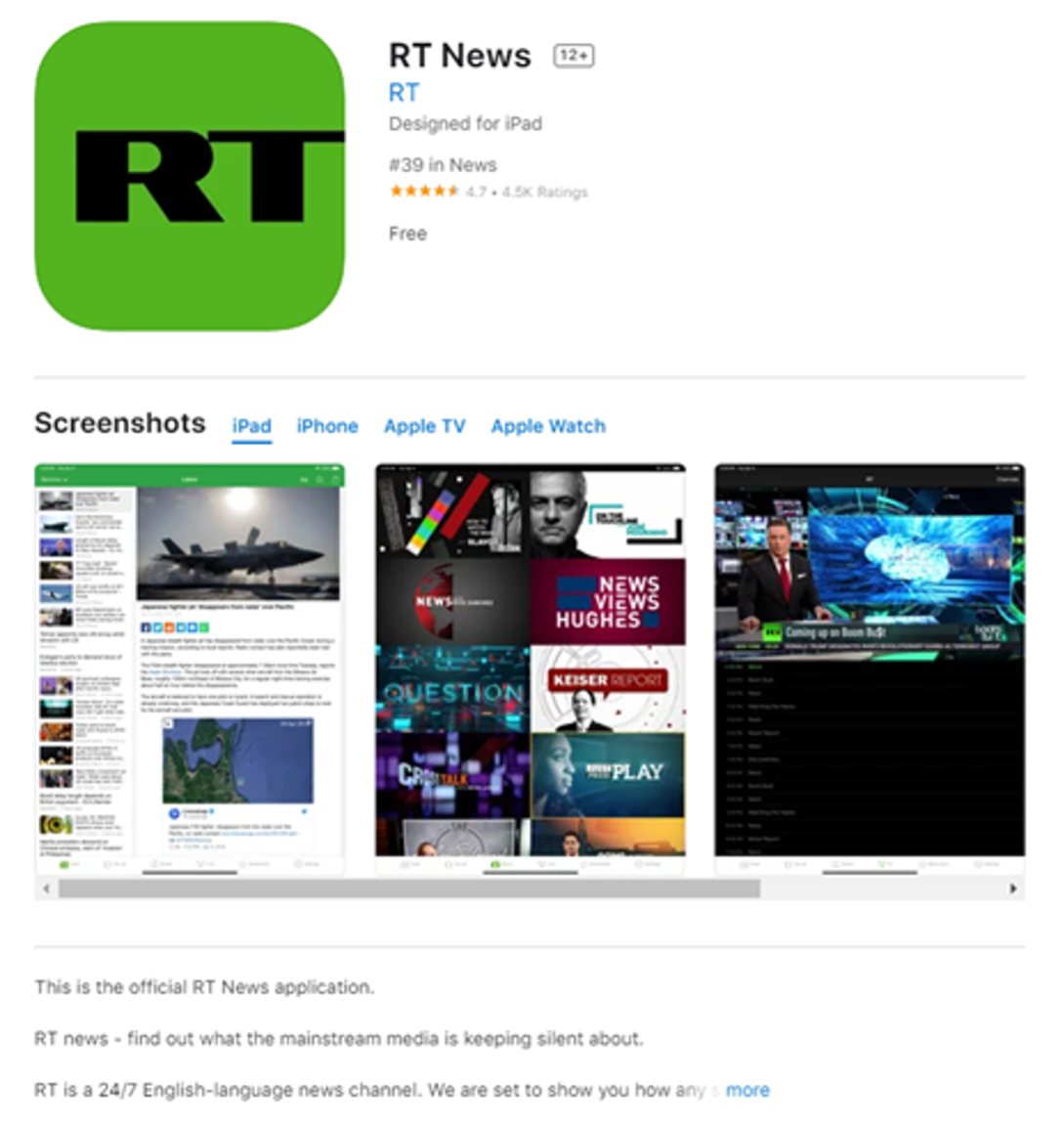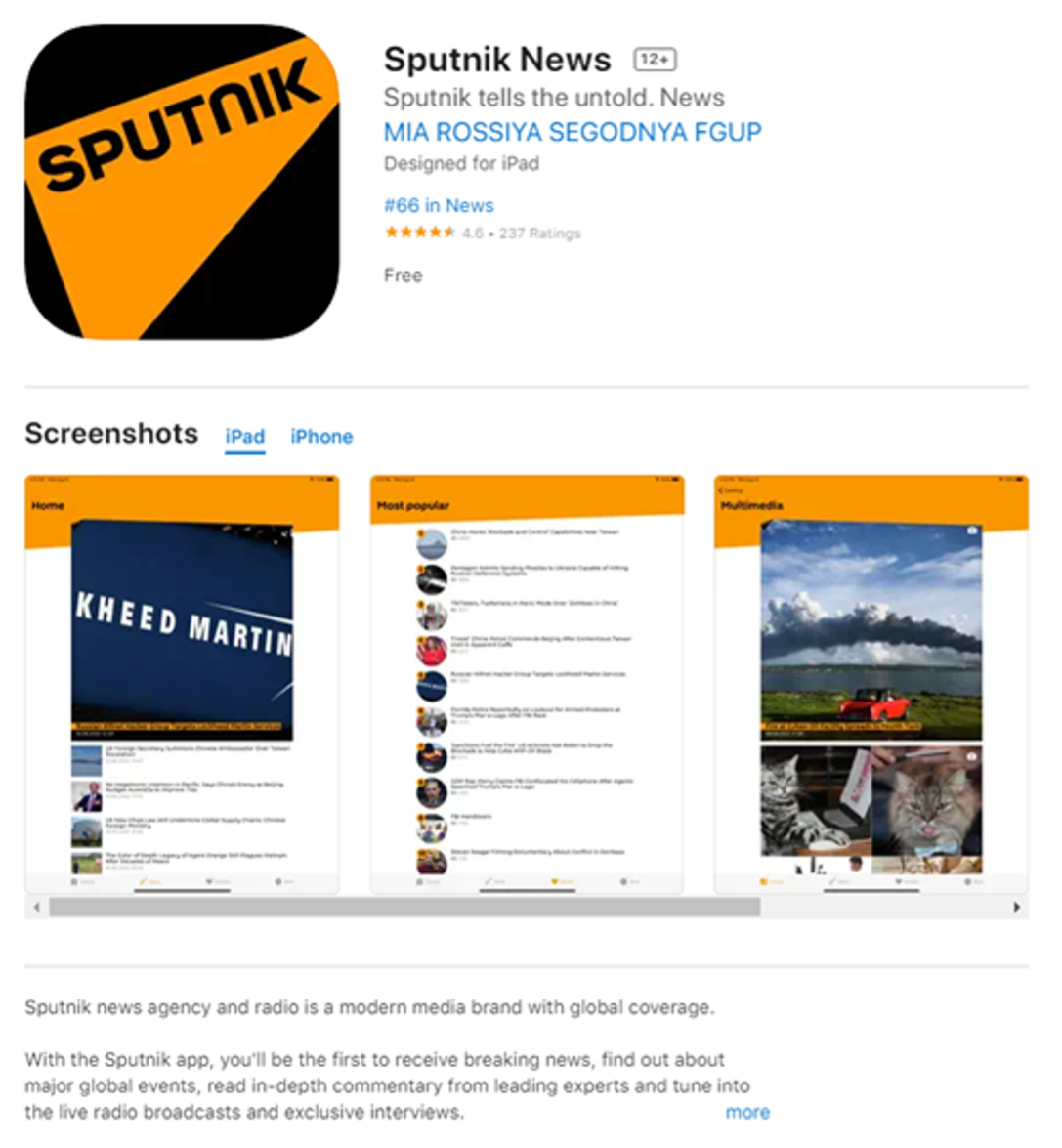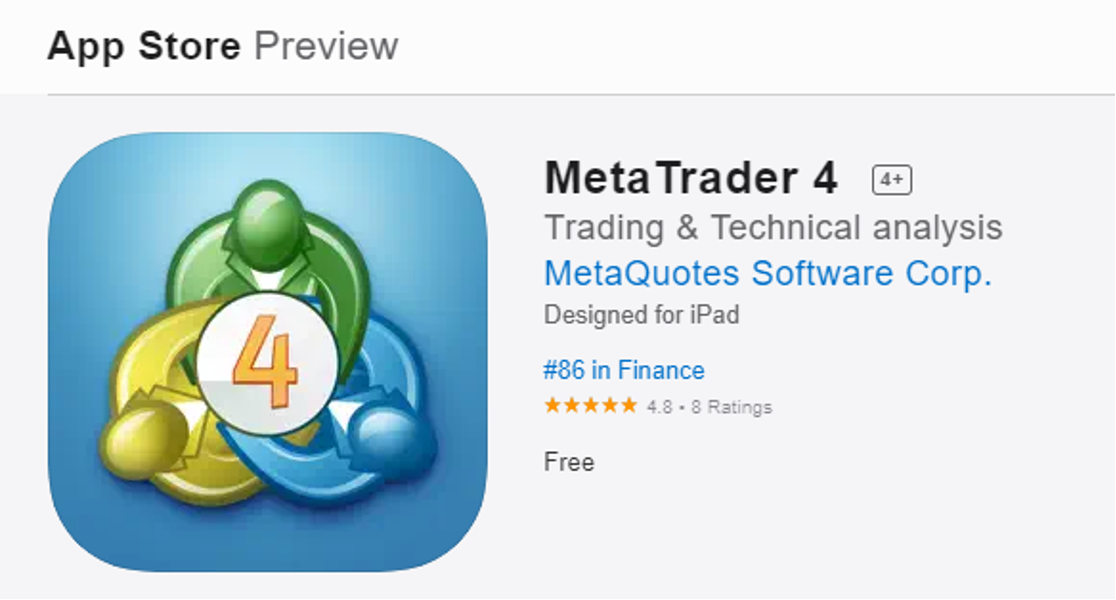Apple’s opaque and arbitrary curation policies during the war
A full-scale invasion and a war. That’s what it took for Big Tech companies to finally take some distance from Vladimir Putin’s authoritarian regime. Following Russia’s invasion of Ukraine, Apple, Google, Meta and other tech companies took unprecedented steps to ensure they were not facilitating the Russian government’s unlawful actions and authoritarian narratives.
After the war began, Apple’s ambivalence in content curation decisions raises questions. Apple’s post-war conduct also contributes to the general opacity surrounding the company’s app removal policies.
Complying with Sanctions?
RT News and Sputnik News
Apple has always claimed it was following local laws to the letter. Following European Council’s sanctions on March 1, 2022, Apple removed the apps of two state-controlled media, RT News and Sputnik, from all App Stores except Russia’s.
In a statement published on applecensorship.com on March 4, GreatFire condemned the restrictions imposed by the European Union (EU) on the two Russian state-owned media, saying that, not only was this ban “inefficient and counterproductive” but that it set a “dangerous precedent for freedom of access to information in the EU and in the rest of the world”.


Under EU sanction rules, Apple was legally obliged to remove the apps and did so between February 28th and March 1st. However, as the sanction only provided that RT and Sputnik could not operate in any of the EU territories, Apple could have decided to leave the apps in non-EU App Stores.
At first, the company kept the two apps available in Russia’s App Store. But RT News was eventually removed by Apple from Russia’s App Store between the 23rd and the 27th of June, as shown by the App Store Monitor, while Sputnik News remains available in Russia’s App Store and has never been affected by any temporary removal since the start of the war. This discrepancy in Apple’s response went unnoticed. In the end, the censorship of these apps in non-EU App Stores can be attributed to the company’s own arbitrary decision, and only the removals from the 27 EU-based App Stores were a result of Apple’s legal obligations.
These global removals were part of an all-out effort by Apple to advertise on its stance regarding Russia. The company had simultaneously imposed limitations on its Apple Pay service and, on March 1, it issued a statement saying it had “paused all product sales in Russia” after having stopped all exports into its sales channels in the country. Apple also mentioned it had disabled traffic and live incidents in Apple Maps in Ukraine. A couple of days later, media reported that Apple reverted its decision to show Crimea as Russian territory.
On March 2, Tim Cook sent out an email to all employees saying Apple was “donating to humanitarian relief efforts and providing aid for the unfolding refugee crisis.” (…) “I take comfort in knowing that we are united in our commitment to each other, to our users, and to being a force for good in the world.”, the email concluded.
But such measures stand in contrast to Apple’s collaboration with Moscow just days prior to the invasion, and to its engagement with authoritarian regimes (including China and Saudi Arabia). Indeed, until February 24, 2022, Apple had been eager to comply with all Russian laws and demands from the Russian censorship bureau, despite the known consequences of these demands on human rights.
Less than three weeks prior to the invasion, Apple had opened a ‘representative office’ in Russia, becoming the first company to comply with the Kremlin’s ‘Landing Law’, a set of new rules requiring foreign technology firms to localize their operations in the country according to the newly imposed regulations. Less than five months prior to this decision, Apple had removed the app affiliated to opposition leader Alexey Navalny from its App Store.
VKontakte and Mail.ru
Apple’s recent actions regarding several other apps owned by Russian oligarch’s companies affected by the United Kingdom’s sanctions, point towards further contradictory behavior from Apple, and raise questions whether Apple is really complying with government’s international sanctions regimes.
On September 26, Apple removed all apps owned by Russian company VKontakte (aka VK) including “VK: social network, messenger”, a Russian equivalent of Facebook, and the email application “Почта Mail.ru” from all App Stores where the apps were previously available. VKontakte’s parent company is now owned by two companies, Gazprom and Sogaz, the latter being controlled by the family of Yuri Kovalchuk, a powerful billionaire with close ties to Russian President Vladimir Putin. According to VKontakte, which said it had asked for clarification, Apple did so without informing the social network company. However, the explanation for these removals came the next day in a brief statement given by one of Apple’s spokesperson to the press:
“These apps are being distributed by developers majority-owned or majority-controlled by one or more parties sanctioned by the UK government. In order to comply with these sanctions, Apple terminated the developer accounts associated with these apps, and the apps cannot be downloaded from any App Store, regardless of location. Users who have already downloaded these apps may continue to use them.”
On the same day the UK’s government announced its new sanctions, Apple removed the dozen apps that “V Kontakte OOO” (VKontakte’s name on Apple’s website) was offering at the time on the App Store.

On October 14, 2022, Apple quietly reinstated VK’s social network and Mail.ru apps in all its App Stores (although Mail.ru remained unavailable in China and Ukraine where it was already blocked before Apple had complied with the sanctions). Following the observations of the App Store Monitor, the Guardian inquired Apple on these discreet restorations, but the company chose to ignore the request. The ownership of VKontakte and Mail.Ru had not changed in the past month, and the leadership of these groups remained sanctioned by the British government.
On October 18, tests made by the App Store Monitor confirmed that Apple had quietly restored some of VK group’s apps in its App Stores. Again, no information was immediately provided by Apple to explain its decision. The company eventually issued a short statement in response to the many articles commenting the return of the apps:
“The apps from this developer were removed from the App Store, as required by law, after multiple requests were made to the developer to provide documentation to verify that they were not in violation of UK sanctions. Subsequent to the removal, the developer has provided the requisite information verifying that they are not majority owned or controlled by a sanctioned entity. Thus, the apps have been reinstated to the App Store.”
However, Apple’s explanations do not lift concerns on the company’s arbitrary management of its App Store, as Apple’s decision to comply with the sanctions seems to have been made immediately after the UK’s government issued the sanctions, making highly improbable the “explanation” given by Apple.
How could Apple have repeatedly asked, to no avail, for documents from VK, when the sanctions and Apple’s decision were almost simultaneous ? Why would VK itself and the Russian Ministry of Digital Affairs need to send Apple requests for clarification on the disappearance of its apps and to investigate “the reasons for deleting VK applications and developer accounts” if that possibility had be discussed with VK for weeks prior to the removals ? Unfortunately, Apple was not asked these questions.
The Need for Greater Transparency in Times of Crisis
Apple’s ability to impact the ongoing crisis in Ukraine fits into a wider trend of how large tech companies’ choices have increasingly geopolitical implications and should warrant for increased transparency on major decisions relating to or affecting the conflict and the populations living in it.
The example of other companies such as Mailchimp, Slack, Sectigo, which provide essential communications and website security tools, is telling. They all blocked Russian accounts indiscriminately, affecting members of the civil society at the same time. This directly helped Putin’s regime to silence activists and journalists.
On July 13, 2022, a group of U.N. human rights experts expressed urgent concerns over technology companies carelessly withdrawing from the Russian market. They warned companies not to take action in response to the war “without necessarily taking into account the negative impacts on human rights of people left behind.” They also argued against “leaving human rights defenders and civil society organizations with little access to the information and communication infrastructure vital for their work,” and urged businesses to “be mindful of human rights throughout their operations and try to help Russian human rights defenders and civil society organizations avoid complete isolation.”
Apple’s signature behavior of trying to conceal every single decision it takes regarding its App Store puts users at risk of being deprived of crucial tools overnight and without alternatives to access those tools.
The Dangerous Opacity Behind App Removals in Wartime
Many of the removals from Russia’s App Store detected by the App Store Monitor occurred after the start of the war. Out of 174 app removals from Russia’s App Store recorded from January 1 until September 22, 2022, 168 occurred after the start of the war.
See the list of app removals from Russia’s App Store
Due to Apple’s lack of statements about Apple-ordered removals, either for legal or internal reasons, it is virtually impossible to know the reasons behind every single removal without inquiring to the apps owners themselves.
An undefined number of apps, which are used by members of civil society to work, communicate or protect their privacy and circumvent censorship, were removed in the first weeks and months of the war. Below are just a few examples:
| App | App Rating | App Store | Date/time of removal | Change | Category/Tag |
|---|---|---|---|---|---|
| VPN Hotspot - Best VPN Proxy | 14 | Russia | 5/15/22 15:45 | Deleted | VPN |
| Taimi: LGBTQ+ Dating, Chat | 1779 | Russia | 5/10/22 4:16 | Deleted | LGBTQI+ |
| VPN Unlimited - IP changer app | 238 | Russia | 4/6/22 19:22 | Deleted | VPN |
| Badoo — Dating. Chat. Friends | 20834 | Russia | 3/15/22 1:49 | Deleted | Dating |
| BC: LGBT & Bisexual Dating App | 36 | Russia | 3/15/22 1:44 | Deleted | LGBTQI+ |
| Bumble: Dating, Friends & Bizz | 74802 | Russia | 3/15/22 1:44 | Deleted | Dating |
| Documents: Media File Manager | 53618 | Russia | 4/21/22 22:06 | Deleted | Tools |
| LaoWangBooster-No Log | 5546 | Russia | 5/10/22 7:35 | Deleted | VPN |
| HUD™ Dating & Hookup App | 2430 | Russia | 5/12/22 17:49 | Deleted | Dating |
In some cases, notably when the apps’ owners have communicated on their website or social media account, it is fairly easy to determine who initiated the removal. But in many cases, it cannot be determined without contacting the apps’ owners. In some cases, apps were removed voluntarily from the app’s owners/developers without any communication, while in other cases, companies announced their decision to pull-out from Russia (e.g. Mailchimp), or to forbid use of their app by Russian nationals without removing their app (e.g. Airbnb) from Russia’s App Store.


The 168 removals recorded by the App Store monitor since March 1st, 2022, represent a fraction of all the apps that have effectively disappeared from Russia’s App Store in 2022. According to data from a mobile market intelligence firm cited by TechCrunch on March 15, 2022, the Russian App Store lost 6,982 mobile apps in the first two weeks following the Ukraine invasion, as numerous companies pulled their apps and games from Apple’s App Stores in the country.
The categories of apps that have seen the largest number of removals from the Russian App Store included those in Games, Productivity, Utilities, Music, Business, Education and Health. This is confirmed by the data of the App Store Monitor on app removals from February to September 2022.
Some technology companies have not exited Russia’s market - including Microsoft, Google, Adobe, & TikTok - which have kept many of their products available. Many VPN apps have also stayed in Russian app stores & have risen to the top of the App Store charts.
Without projects such as AppleCensorship, it would be impossible to have even the slightest idea of what has happened in Russia’s App Store since the beginning of the war. Even with constant monitoring of app removals from the App Store, questions remain on the reasons behind those removals, as companies which exited Russia’s market or decided to restrict their product in Russia have not systematically communicated on their actions.

After the sudden removal of its apps Meta Trader 4 and Meta Trader 5 from the App Store, MetaQuotes, a trading platform company and owner of the apps, dismissed the assumption that the delisting has to do with the West’s response to Russia’s war on Ukraine. “We do not believe that Apple’s actions are linked in any way with the Western sanctions on Russia,” the MetaQuotes representative said.
While it can be assumed that a majority of these targeted removals were the result of apps’ owners decisions, however, Apple’s complete opacity over its management of the App Store prevents us from identifying all apps that have been quietly deleted by Apple in Russia’s App Store and, like VKontakte’s recent case has shown, in other App Stores too. Such opacity gives Apple the ability to take arbitrary decisions for which even the apps’ owners struggle to receive any justification.